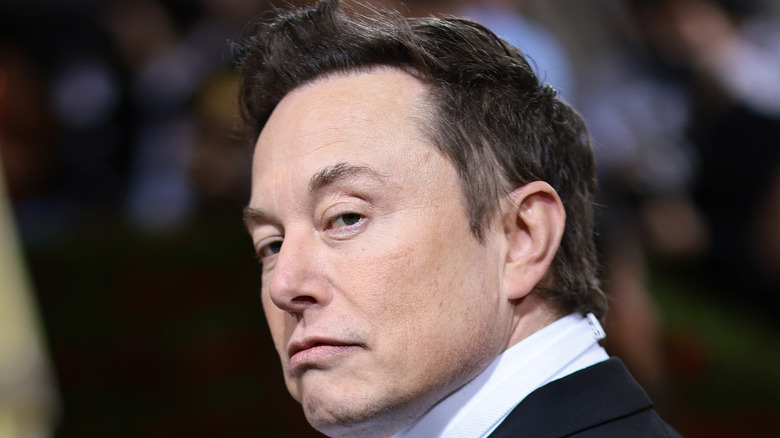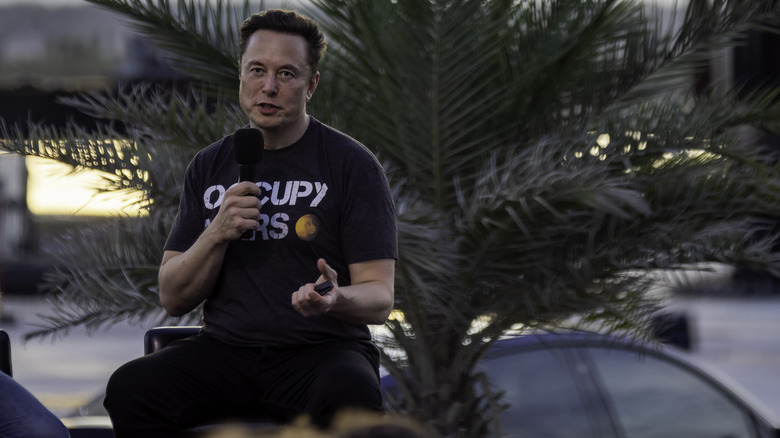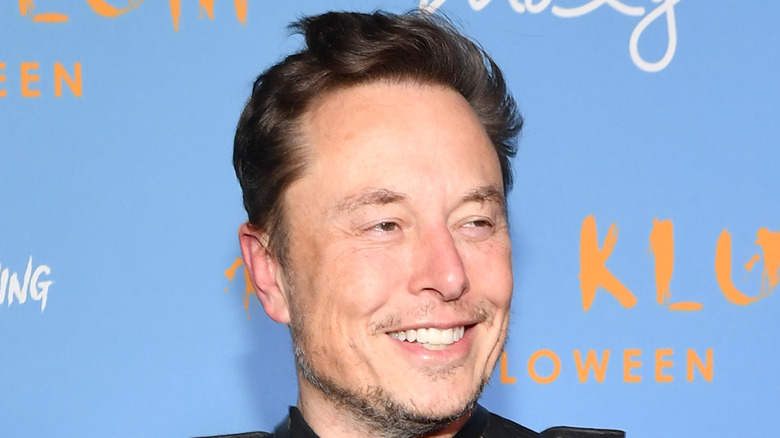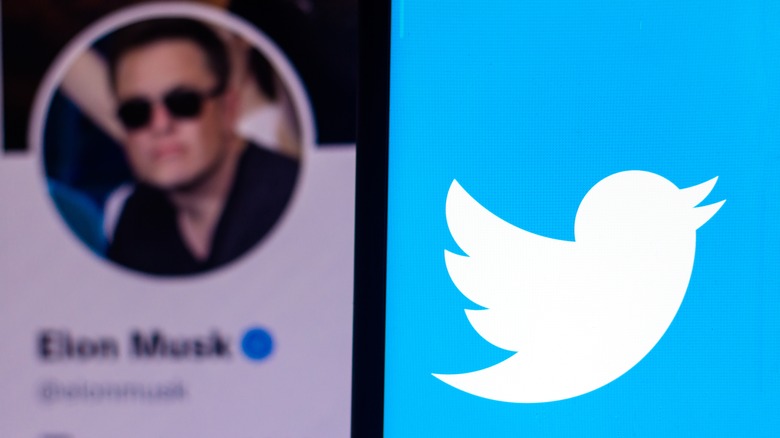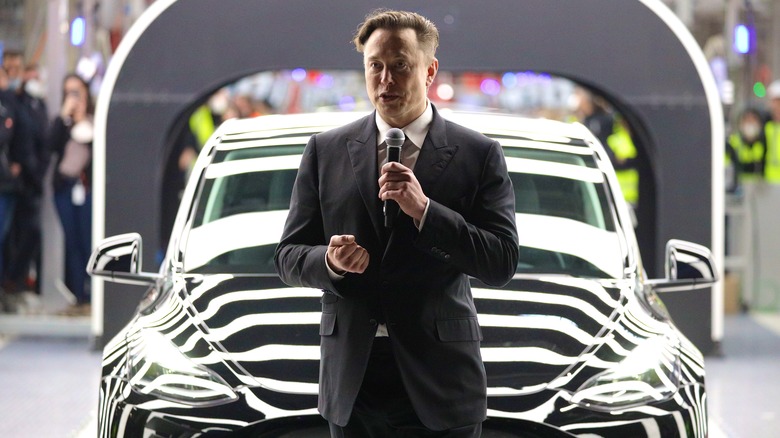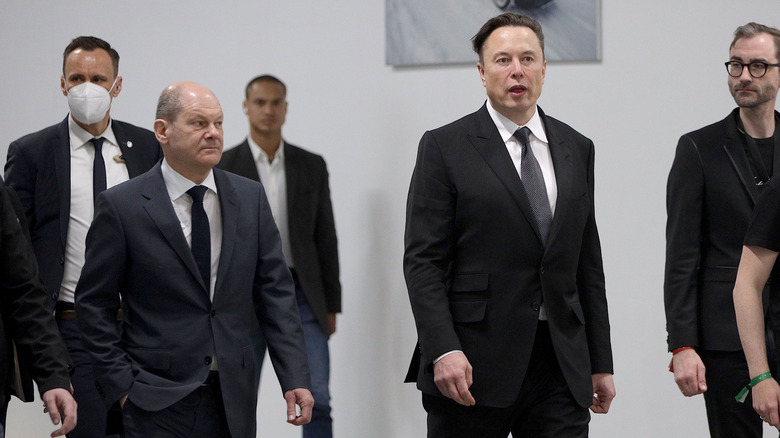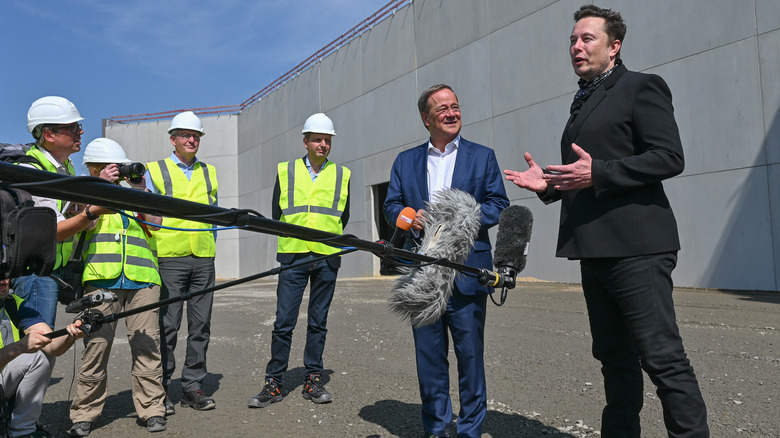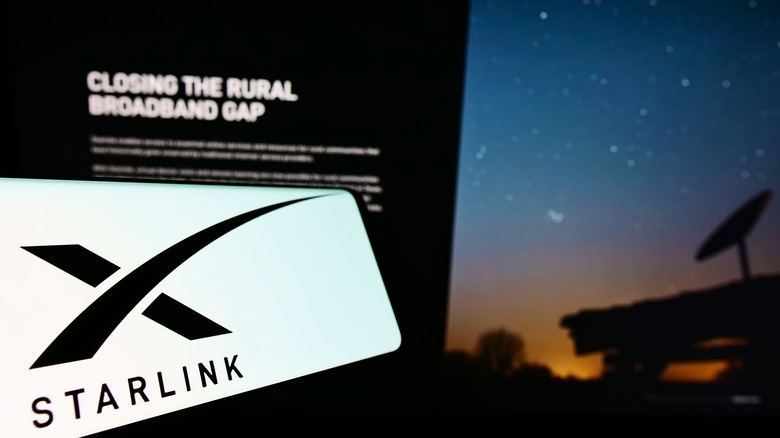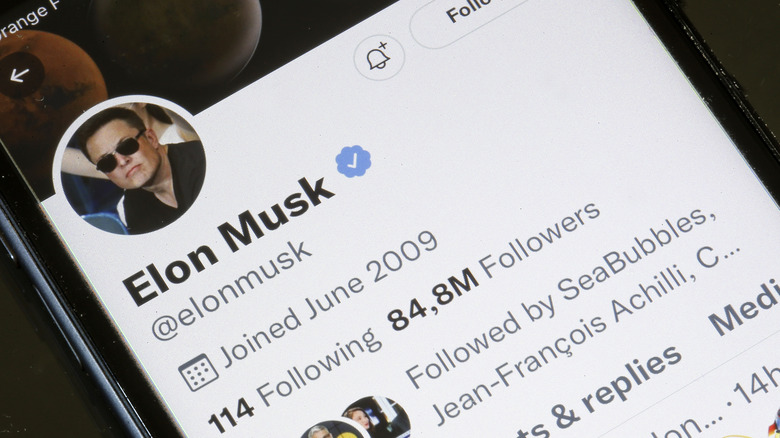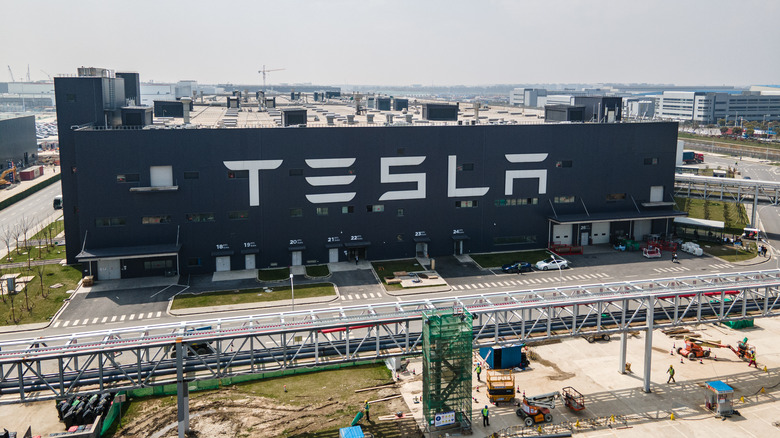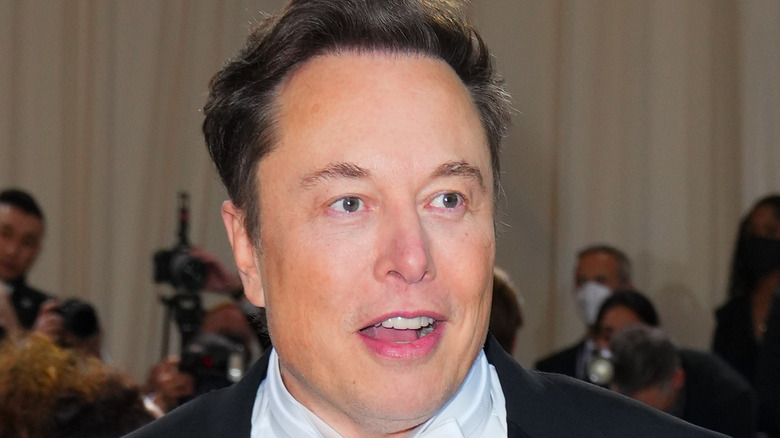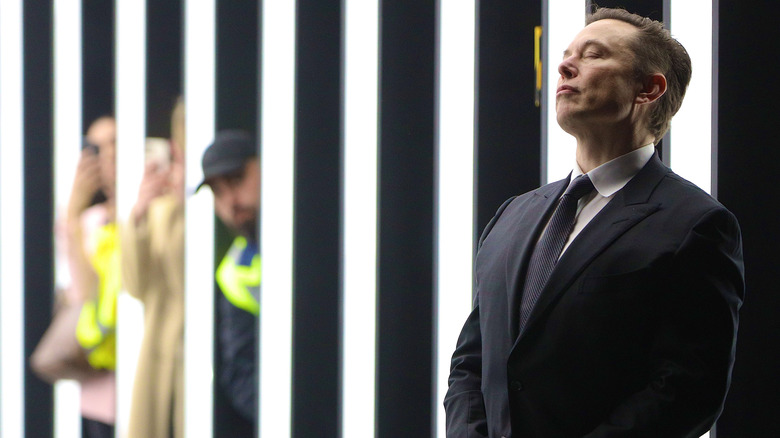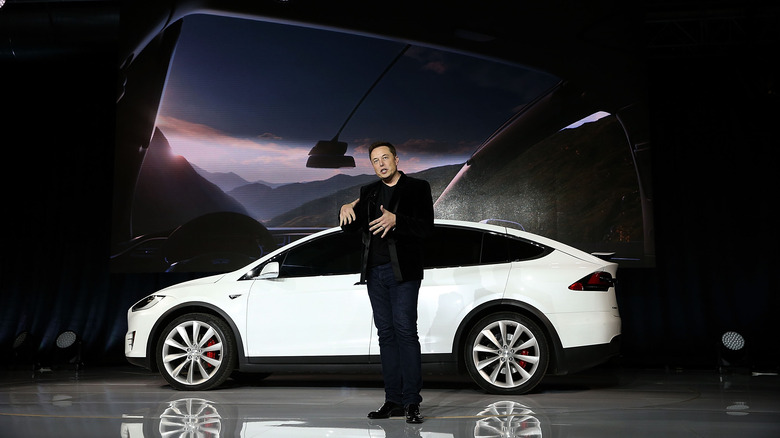How Elon Musk Became Such A Controversial Figure
Elon Musk first came onto the scene as a prodigious entrepreneur who gifted the world PayPal and produced environment-friendly cars, details Britannica, earning praise from environmentally conscious people. He also founded a rocket company to allow humans to become a multi-planetary species. If not impressive, it was innocuously quirky. Musk was the real-life Tony Stark, but instead of selling guns, Musk's domain was assuredly moral. "Savior of the human race" had become his brand. So ... what happened? A lot, apparently. Musk's reputation has taken a huge hit in recent years with controversial comments he's made on Twitter and other scandals that have emerged, but one Tesla executive says that Musk has always been this way, and the public is just now learning about it, per Vanity Fair.
The disdain for the world's richest man became apparent when he finally got hold of Twitter in 2022. Celebrities left the platform and took shots at the newly minted CEO before they did, reports NBC News. Much of the turn against Musk seems to come after his criticism of COVID-19 mandates and his alignment with the political right, but there are several reasons for his unpopularity worth noting. Read on to learn how Musk became controversial.
He's criticized COVID-19 mandates and lockdowns
Elon Musk really began to ruffle feathers when he made some unpopular comments about the pandemic-caused lockdowns. One of his first comments came on March 6 2020, a tweet in which he said the panic around the pandemic was dumb. It effectively downplayed the severity of the pandemic and its death toll. After predicting that the pandemic would end by May 2020 (via Twitter), Musk began criticizing lockdowns that shut down businesses and forced people to stay home. During a Tesla Q1 2020 earnings call in April, he went so far as to call stay-at-home orders fascist, per CNBC. According to Vanity Fair, Musk's criticism had less to do with any principled philosophy than it had to with the fact that Tesla's factory production was being adversely affected. In fact, he had been concurrently canceling trips to Asia because of the virus.
In a podcast interview with The New York Times, Musk said he and his kids had no plans on getting the vaccine, since he didn't believe they were at risk of getting infected. He also made an unsubstantiated claim that there were negative reactions to booster shots, per Twitter. However, he later changed his stance, when he told Time that science backed up the vaccination's legitimacy and confirmed his family was vaccinated.
His pivot to the Republican Party irked people
There was a time when Elon Musk donated exclusively to the Democratic Party, benefitting names like Hillary Clinton, Barack Obama, and Democratic Party groups across various states, per Open Secrets. It fit the image many people on the political left had of him. As one of the largest purveyors of renewable energy tech in the world, Musk was naturally aligned with the values of liberals and the Democratic Party — environmentalism and saving the world, per Politico. In effect, Tesla cars became symbols of liberal do-goodery, and many people bought them for that reason, according to The New York Times.
That went all out the window when Musk urged his Twitter followers to take the red pill in May 2020. "The red pill" is a term sometimes aligned with the men's rights movement and an ideology that is notably misogynist, notes The Guardian. The New York Times also reports it can be taken as skepticism of experts, the media, and any sort of progressive stance or ideal. Musk himself later clarified the "red pill" stood for "a free-thinking attitude ... [and] the truth, no matter how gritty and painful it may be." Regardless, it came across as non-progressive, and it sent Tesla supporters into panic mode.
The red pill aside, Musk began his political shift toward the right with criticism of anti-COVID-19 efforts (via Twitter), and formally confirmed his separation from the Democratic Party on May 30, 2022, on his Twitter account. His political break-up must have hurt. According to Politico, Musk's estrangement from the left was internalized as a loss for that side, since, due to his power and influence, he's often seen as an asset for whoever he aligns himself with.
People believe Twitter will become a 'hellscape' under him
Many people don't appreciate Elon Musk's takeover of Twitter, to say the least. The roots of that frustration can be traced to Musk's philosophy of free speech and how it should be handled on the site. From the outset, Musk made it clear that issues of free speech on Twitter concerned him (via Twitter) and was the driving force behind his purchase of the social media site, notes his SEC filing. Yet, people were wary of how unrestricted he would allow speech to become on Twitter and whether the site would devolve into a cesspool of hate, trolling, and disinformation, per NPR.
People were not optimistic. Dislike against Musk grew since many believed his Twitter approach would enable online abuse against women and minority groups, thereby making him culpable. The jury on Donald Trump had long been decided against him, and here was Musk, promising to bring him back onto the platform, reports Reuters. That move alone could destroy democracy, detractors argued. Musk also made it clear that he wanted to do away with permanent bans on accounts, which has historically been one line of defense against problematic users. But in an effort to reassure Twitter advertisers that they need not scramble from the site, Musk posted a statement on Twitter that vaguely acknowledged controls put in place to keep the platform from devolving into a "hellscape."
He fostered a toxic culture at Tesla
The year 2022 was tough for Tesla Inc's marketing department, and it certainly didn't do Elon Musk's image any favors. Accusations of racism against his company led to a lawsuit brought on by California's Department of Fair Employment and Housing (DFEH) in January, reports Fortune. The suit came after hundreds of complaints were filed by Tesla employees, alleging systemic harassment against Black workers. One worker heard 50 to 100 racial slurs a day. The controversy centered on the company's Fremont factory, where reportedly racist graffiti could be found throughout the building. The allegations came on the heels of a lawsuit brought by a former elevator operator, who said that he was subjected to racial slurs at Tesla, according to The New York Times. In October 2021, the court awarded him $137 million.
More trouble for the company ensued when investor Solomon Chau accused Musk and Tesla's other executive directors of breaching fiduciary duty by enabling a toxic work environment, leading to his own lawsuit against the company, explains Fortune. Tesla mostly shrugged off the accusations, touted its inclusivity bona-fides, and called the lawsuit from California's DFEH misguided. Although the allegations mostly target middle-managers and workers, it nevertheless reflects badly on Musk. Erik Gordon, a business professor at the University of Michigan, compared Musk to an executive from the 1950s who acts indifferently to allegations of racism and other social issues, via NPR.
Elon Musk doesn't seem very nice
Elon Musk's reputation precedes him, and reports don't paint him in a very positive light. For one, his management style has been painted as ruthless. According to Tim Higgins' "Power Play: Tesla, Elon Musk, and the Bet of the Century," Musk held his engineers on a very short leash and was nothing short of demanding. On one occasion, as Musk desperately waited for his engineers to complete his Model 3 sedan, he demanded that each worker go around the room and say what he or she was doing to make the project work. The moment was so intense that one engineer quit. He also had a habit of blowing up at those beneath him, both executives and rank-and-file members. Executives joked that instead of food, Musk would devour a worker by erupting at them in anger.
He also wasn't afraid to fire workers whenever he pleased, sometimes for no better reason than a disagreement. After Tesla executive Peter Rawlinson quit, likely because of Musk's temper tantrums, Musk fired another executive for failing to bring back Rawlinson to the company. He threatened to fire a public relations firm after Musk's name was left out of a New York Times article on Tesla, writes Higgins. And there was no one too big or too small for his rage: He even threatened to oust Morgan Stanley and Goldman Sachs bankers from the team in 2010.
He managed to evade #MeToo repercussions
The most disturbing reports surrounding Elon Musk are the allegations of sexual harassment made at Tesla. Several women have sued the company, saying it fostered a culture of sexual harassment, per Rolling Stone. On one occasion, male employees took pictures of a woman's backside without her knowledge and shared the photos with the rest of the workforce. Much of the alleged behavior came from men who regularly sexually objectified female employees, such as commenting on their attractiveness. One worker, Alisa Blickman, said a male worker touched her inappropriately and lied to her about his status in order to dissuade her from reporting him. She also regularly received unwanted contact by her supervisor, including back massages.
Musk himself was accused of sexual misconduct when a flight attendant and masseuse said Musk exposed himself to her and asked for an erotic massage in 2016, reports Business Insider. He offered to buy her a horse in return and touched her without her permission. The flight attendant was left traumatized and began to feel as if Tesla was striking back by cutting her shifts. This led her to file a complaint with the human resources department, and she was offered $250,000 in exchange for an NDA and an agreement not to sue. Musk called the claims wild and said it was part of a concerted effort to silence him after he announced his intentions to buy Twitter.
His comments on Russia and Ukraine have been derided
Although Elon Musk lended a hand to war-torn Ukraine with access to his internet service, Starlink, per The New York Times, his Russia-friendly political meddling had some people annoyed. On October 3, 2022, Musk tweeted out a peace proposal to end the Russia-Ukrainian conflict, which would involve elections in the Russian-annexed regions to put the choice in the hands of the people, formally confirm Crimea as part of Russia, and request that Ukraine remain neutral. At once, Musk received a rush of criticism from Ukrainian officials and political commentators who likened his plan to Russian propaganda, since it largely reflected Russia's own requests, reports Business Insider. Eurasia Group president Ian Bremmer tweeted that Musk had spoken to Russian president Vladimir Putin about his goals for the conflict's end, which made it seem as if Musk had done Putin's bidding. Musk took to Twitter to deny it, saying Bremmer was untrustworthy.
But those who doubt Musk's loyalties to Ukraine first received ammo on March 5 when Musk tweeted that Starlink would not censor Russian-state news since he was a free speech absolutist. And several days after his proposed peace plan, Musk announced that Starlink could not continue funding its unlimited Ukrainian coverage. Musk called the demands to send more satellite internet terminals to Ukraine pro bono unreasonable. The parent company, SpaceX, requested that the Pentagon take over financial responsibility for Starlink, reports CNN.
He's made offensive remarks about various groups of people
Elon Musk is famously without a filter, and it's not always charming. He's been scrutinized and derided for making offensive comments toward various people. And on one occasion, he managed to target all women, particularly those in STEM. Musk proposed on Twitter the creation of a school called Texas Institute of Technology and Science. After someone suggested that "science" and "technology" should be flipped, he remained adamant that the letter "t" should come first. Because, you know, the acronym would be "TITS," via Twitter. Real nice.
Musk has been even less kind to Canadian prime minister Justin Trudeau. In February 2022, Musk posted a meme of Adolf Hitler requesting people to stop comparing him to Trudeau, because unlike the Canadian leader, Hitler had a national budget. The offensive meme was deleted after a widespread negative reaction, and the American Jewish Committee called Musk's tweet unacceptable, per Business Insider. The post came after Trudeau's controversial handling of the "Freedom Envoy" of Canadian truckers who protested the country's vaccination mandate.
People have criticized Tesla's work environment
Tesla and its core work-culture doesn't have a great reputation for being employee-friendly. In 2016, an investigation from Mercury News found that Tesla had used overseas contract workers to build a paint shop for its Model 3 sedan, but the workers were only paid $5 an hour during 10-hour work days. Much of the blame lay with the company that recruited the workers, but Tesla was named in a subsequent lawsuit after a worker sustained life-threatening injuries, reports The Guardian. Musk said he wasn't aware of the cheap labor Tesla used and promised an investigation (via Twitter).
Then in May 2020, Musk flouted public health orders and reopened Tesla's factory amid the COVID-19 pandemic. Musk, who was critical of government pandemic mandates, dared officials to arrest him on Twitter. The move didn't look great in hindsight when The Washington Post later reported that the company received 450 infection cases, with 10 occurring in that first month. Workers who voiced fears about the risk of infection were fired. Workers also didn't believe that safety standards at the factory were upheld, and its been compared to a sweatshop, per SF Weekly. And there's not much hope for unionization since Musk has made his opinions on that pretty clear. In 2018, Musk tweeted that workers would lose stock options if they unionized.
Reports of illicit affairs reflect poorly on Elon Musk
If people needed additional reasons to justify their dislike of Elon Musk, they would point to reports about his affairs and personal scandals. According to court documents obtained by Business Insider, Musk and an executive at one of his companies, Shivon Zilis, had children in secret, and they petitioned a court to change the twins' last name to Musk's. The twins were born shortly before Musk's second child with musician Grimes, notes The Independent. However, the situation might not be as scandalous as it first seemed, as it's since come to light that Zilis conceived via in vitro fertilization, and no romance was involved, per Reuters. However, the relationship still raised questions about corporate ethics.
And there's the time he reportedly backstabbed his friend by sleeping with his wife. The friend was Sergey Brin, co-founder of Google, reports The Wall Street Journal. Brin and Musk had been close for a while, and Musk often stayed at his house. Brin had also lended Musk a hand at a time of need; when Tesla was at risk of going underwater during the 2008 financial crisis, Brin gifted Musk a $500,000 investment. But this didn't stop Musk in December 2021 from taking Brin's wife, Nicole Shanahan. Maybe he was upset that Brin turned on Tesla and sold his stakes in the company. Either way, Brin and Shanahan divorced in 2022, with other noted hiccups in their marriage, and Musk denied the liaison on Twitter.
People don't like billionaires
It's an eat-the-rich era, and Elon Musk is just living in it. With the increasing amount of democratic socialist voices in politics, like Bernie Sanders and such, there's been some scrutiny on the amount of money people are allowed to accrue. A Current Affairs writer argues that having massive wealth while others live in poverty is inherently immoral. A Teen Vogue writer argues the existence of billionaires is a policy failure, and people can only become billionaires by exploiting others. A lot of this sentiment has been lobbed at Musk, who's had to answer for his wealth. When asked about his opinion on the issue in an interview with TED's Chris Anderson, Musk said that the perspective was flawed but would be understandable had he spent his money recklessly. Musk said he led a meager lifestyle and didn't even own a home. He also defended his business efforts as a moral good for society.
The frustration about Musk's wealth really came to the surface when he was announced as a host for "Saturday Night Live." In response, cast member Aidy Bryant screenshot a tweet from Bernie Sanders in an Instagram story that criticized the amount of wealth Musk owned and alleged that, along with 49 other wealthy Americans, Musk has more wealth than 165 million Americans, per The Washington Post.
His broken promises precede him
Elon Musk has had a reputation of making promises to Tesla fans but never fulfilling them. For one, there's the mysterious Hyperloop. In 2017, Musk announced that his speedy transportation idea was greenlit by government officials, allowing for travel from New York City to Washington D.C. in half an hour. But the most progress they've seen is a 1.7 mile tunnel under Las Vegas (per Boring Company) and a test tunnel in Los Angeles, reports The Washington Post. But the latter has since been dismantled and will soon become a parking lot, reports Bloomberg.
And there's his dream to implant devices into human brains to allow for human telepathy. Musk promised the technology, which was being produced by his company Neuralink, would become available for humans by 2020, notes The New York Times. But so far, Yahoo! reports that Musk has repeatedly shifted the time table to late 2022, since they have only placed the device in monkeys so far. This amidst key members of Neuralink's research team leaving, reports Fortune.
